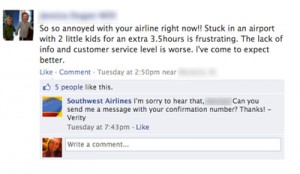Consumers are bringing their customer service issues to social channels. Are you accommodating them there?
By Nicole Petrak, Assistant Editor, and ATTA New Media
It seems that the number of social media sites is only outpaced by the noise around their importance in the business world. Amidst this din, it can be easy to miss a key point - that the ways customers expect companies to use social media outreach are shifting from presence to include service. Service can certainly mean the ability to get information and even book online, but as Summit keynote speaker Erik Blachford pointed out, considering social media channels as part of your customer service solution is now a critical component of effective marketing.
For many companies struggling to simply be present across the growing social media landscape - not to mention trying to create fresh or interesting content - the thought of what could at first seem like an additional set of service-oriented tasks on these channels is overwhelming. But, Blachford's assertion that social media efforts be part of customer service efforts is right - in order to be effective online, companies must not only listen to the increasing consumer chatter, but respond to it.
A Tnooz guest post by, by Michelle Wohl, Vice President of Marketing at Revinate, talks about the studies that show online reviews and reputations are now a stronger booking driver than location or even - get ready - price.
This shouldn't be surprising - the early days of the global recession had customers seeking for the cheapest deal. But somewhere along the way, cheapest has given way to best value. This shift in value conciousness has people weighing what trade-offs are worth it: higher quality at the expense of length of trip, more activities at the expense of quality of accommodations, more authenticity at the expense of pricey dinners or souvenirs. As the individual consumer considers value, they're flocking to sites like TripAdvisor to glean intel from reviews before making their final choice.
But according to Wohl, data shows that responses on customer reviews by the companies in question are also critical - a hotel manager's response to a problematic review would sway a whopping 68 percent of people polled by a TripAdvisor/Forrester study:
As a result, more and more hoteliers are taking the time to craft personal responses to reviews in order to publicly demonstrate that they actively listen to guest feedback and strive to improve the experience of their guests.
Jayne Gorman recently wrote an exceptionally helpful blog post on Huffington Post detailing the Do's and Don'ts of online customer service via social media interaction. Some highlights:
- Be online during your service or product sales window - if that's 24 hours a day, someone needs to responsive 24 hours a day.
- If you can't do that, then set customer expectations by clearing marking on all your sites (including social ones) when customer service is available.
- Be timely in your response.
- Use tools to monitor when and where people mention you.
- Train your staff on how to handle issues that can come up. Gorman has great tips on how to do this.
- Communicate with people via their preferred channels.
For those ... paying attention, there is a huge opportunity to continually improve and deliver better, more personalized service to each guest, thereby strengthening the relationship between brands and their guests. While that goal is centuries old, online reviews and social media are changing the way it is achieved.
Are you seeing more customers reach out across social media channels for service related issues? How do you handle this in terms of training, time and engagement?
